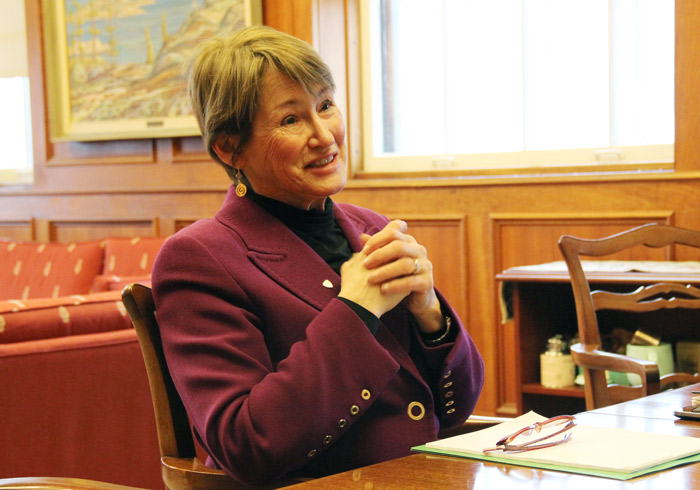On May 25, the McGill Board of Governors (BoG) met in a closed session to approve the re-appointment of Principal and Vice-Chancellor Suzanne Fortier for a second five-year term beginning July 1, 2018. Immediately following Fortier’s reappointment, the BoG held an open meeting, which began with a discussion of several grant requests for genomic research. Next, the BoG approved the McGill Senate’s changes to the Policy on Harassment, Sexual Harassment and Discrimination Prohibited by Law and reviewed the annual report on the Safe Disclosure Policy.
Genomic Technology Grants
Vice-Principal (Research and Innovation) Dr. Rosie Goldstein presented two related grants on genomic research for consideration, both of which the BoG approved. The first, a collaborative project with the Hospital for Sick Children and Génome Québec, allocates $7 million to the development of throughput genomic technologies for the scientific community. The second grant, valued at $9 million, funds an inter-university project with the University of British Columbia and the University of Toronto design new tools for genomic analysis in addition to the development of new technologies.
Both grants were matched by other sources, including the Canada Foundation for Innovation. Goldstein credited Mark Lathrop, the Scientific Director of the McGill University and Génome Québec Innovation Centre, with leading the inter-university collaboration of the second grant.
“It's been [Lathrop’s] leadership that brought about the collaboration,” Goldstein said. “He can really take credit for bringing the country together in this area.”
Updates to the Sexual Harassment Policy
The BoG confirmed a series of changes–approved by the McGill Senate on May 15–to the Policy on Harassment, Sexual Harassment, and Discrimination Prohibited by Law. The changes enable the Senior Equity and Inclusion Officer, a post currently occupied by Pascale Legros, to address complaints and facilitate informal resolutions at her discretion. Complainants will retain the option to bring their disputes to Assessors, who are Faculty members trained to deal with issues including sexual assault, harassment, and stalking. This change will broaden the available resources for victims of sexual violence on campus.
Nevertheless, the policy remains a work in progress. Though third parties who experience or observe sexual harassment can inform Faculty members, they may not file independent complaints. In a memorandum to the Senate prior to its May meeting, Associate Provost (Policies, Procedures and Equity) Angela Campbell wrote that the Senate needed to assess the issue of third parties in the coming year.
Annual Report on the Policy on Safe Disclosure
Additionally, the BoG reviewed the Policy on Safe Disclosure annual report, which summarizes the Policy’s use and outcomes over the last year. The policy allows members of the university community to report misconduct at McGill to the Secretary General without fear of reprisal, serving as a last step if the complainant feels that they have exhausted other options, such as lodging a complaint within their faculty. Secretary-General Edyta Rogowska said that one report had been filed during the 2016 calendar year, down from three in 2015. Though the details remain confidential, an investigation into this year’s complaint concluded that the respondent had not violated any McGill policy. McGill Alumni Association Representative Tina Hobday expressed uncertainty over the fact that only one case had been filed.
“I don't know whether we should take solace in [the single case] and think we're obviously doing a great job, or should we really be concerned that we're not creating an environment where people feel comfortable to come forward,” Hobday said.
Rogowska replied that the low numbers might reflect the fact that members of the McGill community have used other channels to settle complaints this year, but agreed that the BoG should strive to improve on that front.
“We have noticed the need to further raise awareness of the existence of this policy,” Rogowska said. “The Secretary has actually created a webpage that basically spells out the processes through which disclosures can be made. We're trying to raise awareness of this policy at an institutional level.”








